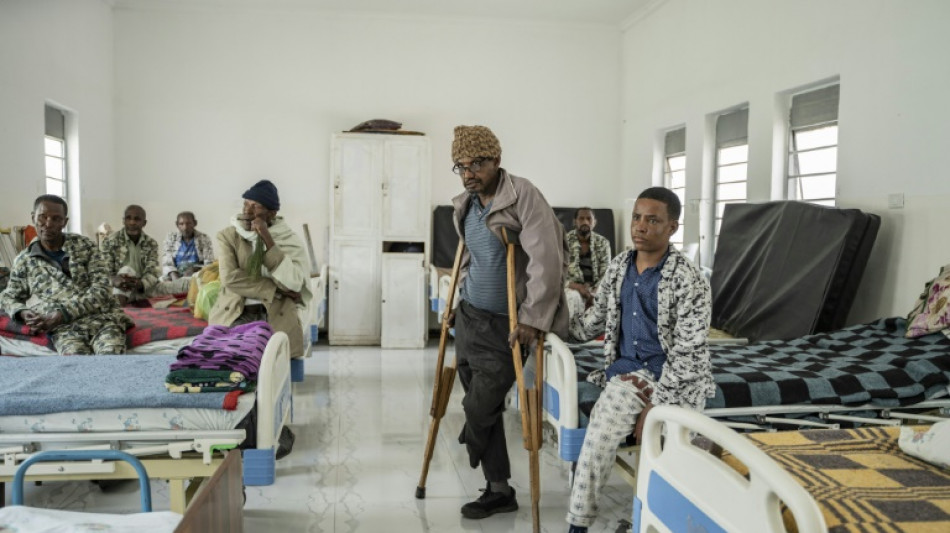
-
 UK counter-terrorism unit probes rappers Kneecap but music stars back band
UK counter-terrorism unit probes rappers Kneecap but music stars back band
-
Yamal heroics preserve Barca Champions League final dream

-
 2026 T20 World Cup 'biggest women's cricket event in England' - ECB
2026 T20 World Cup 'biggest women's cricket event in England' - ECB
-
Bangladesh begins three days of mass political rallies
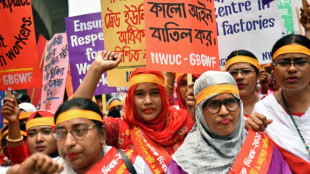
-
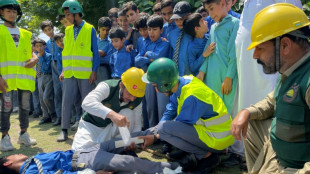 Children learn emergency drills as Kashmir tensions rise
Children learn emergency drills as Kashmir tensions rise
-
Millions of children to suffer from Trump aid cuts
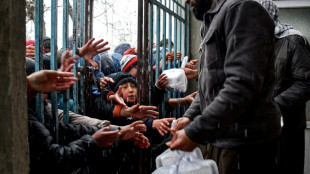
-
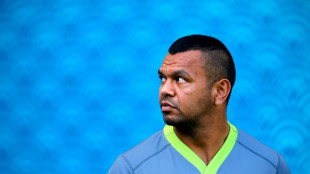 Veteran Wallaby Beale set for long-awaited injury return
Veteran Wallaby Beale set for long-awaited injury return
-
Syria's Druze take up arms to defend their town against Islamists

-
 Tesla sales plunge further in France, down 59% in April
Tesla sales plunge further in France, down 59% in April
-
US calls on India and Pakistan to 'de-escalate'

-
 Israel reopens key roads as firefighters battle blaze
Israel reopens key roads as firefighters battle blaze
-
Europe far-right surge masks divisions

-
 James will mull NBA future after Lakers playoff exit
James will mull NBA future after Lakers playoff exit
-
Ukraine's chief rabbi sings plea to Trump to side with Kyiv

-
 Australian mushroom meal victim 'hunched' in pain, court hears
Australian mushroom meal victim 'hunched' in pain, court hears
-
Lakers dumped out of playoffs by Wolves, Rockets rout Warriors

-
 Booming tourism and climate change threaten Albania's coast
Booming tourism and climate change threaten Albania's coast
-
US reaching out to China for tariff talks: Beijing state media

-
 Tariffs prompt Bank of Japan to lower growth forecasts
Tariffs prompt Bank of Japan to lower growth forecasts
-
Kiss faces little time to set Wallabies on path to home World Cup glory

-
 Serbian students, unions join forces for anti-corruption protest
Serbian students, unions join forces for anti-corruption protest
-
Slow and easily beaten -- Messi's Miami project risks global embarrassment

-
 Fan in hospital after falling to field at Pirates game
Fan in hospital after falling to field at Pirates game
-
Nuclear power sparks Australian election battle

-
 Tokyo stocks rise as BoJ holds rates steady
Tokyo stocks rise as BoJ holds rates steady
-
Bank of Japan holds rates, lowers growth forecasts

-
 'Sleeping giants' Bordeaux-Begles awaken before Champions Cup semis
'Sleeping giants' Bordeaux-Begles awaken before Champions Cup semis
-
Napoli eye Scudetto as Inter hope for post-Barca bounce-back

-
 Germany's 'absolutely insane' second tier rivalling Europe's best
Germany's 'absolutely insane' second tier rivalling Europe's best
-
PSG minds on Arsenal return as French clubs scrap for Champions League places

-
 UK WWII veteran remembers joy of war's end, 80 years on
UK WWII veteran remembers joy of war's end, 80 years on
-
Myanmar junta lets post-quake truce expire

-
 Rockets romp past Warriors to extend NBA playoff series
Rockets romp past Warriors to extend NBA playoff series
-
Messi, Inter Miami CONCACAF Cup dream over as Vancouver advance

-
 UN body warns over Trump's deep-sea mining order
UN body warns over Trump's deep-sea mining order
-
UK local elections test big two parties

-
 US judge says Apple defied order in App Store case
US judge says Apple defied order in App Store case
-
Seventeen years later, Brood XIV cicadas emerge in US

-
 Scorching 1,500m return for Olympic great Ledecky in Florida
Scorching 1,500m return for Olympic great Ledecky in Florida
-
Israel's Netanyahu warns wildfires could reach Jerusalem

-
 Istanbul lockdown aims to prevent May Day marches
Istanbul lockdown aims to prevent May Day marches
-
Moderna Reports First Quarter 2025 Financial Results and Provides Business Updates

-
 DEA Unconstitutional Marijuana Hearing - MMJ to File Emergency Injunction and Suit for Irreparable Harm
DEA Unconstitutional Marijuana Hearing - MMJ to File Emergency Injunction and Suit for Irreparable Harm
-
Formation Metals Announces Appointment of Adrian Smith to Advisory Committee

-
 Cerrado Gold Announces Q4 And Annual 2024 Financial Results
Cerrado Gold Announces Q4 And Annual 2024 Financial Results
-
Australian guard Daniels of Hawks named NBA's most improved

-
 Mexico City to host F1 races until 2028
Mexico City to host F1 races until 2028
-
Morales vows no surrender in bid to reclaim Bolivian presidency
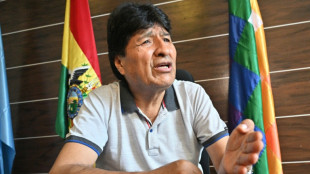
-
 Ukraine, US sign minerals deal, tying Trump to Kyiv
Ukraine, US sign minerals deal, tying Trump to Kyiv
-
Phenomenons like Yamal born every 50 years: Inter's Inzaghi


Patients with leprosy face lasting stigma in Ethiopia
Tilahun Wale not only lost his right foot to leprosy -- a disease that still affects thousands in Ethiopia -- he also lost his family.
"My family abandoned me. They blocked my number and refused to speak to me," said Tilahun, 46, a farmer in Ethiopia's populous Oromia region, who contracted leprosy around 10 years ago.
Ethiopia, a country of some 130 million people in northeastern Africa, officially eliminated leprosy as a public health problem in 1999, after case numbers dropped below one in 10,000.
But some 2,500 infections are still recorded there each year, according to the United Nations World Health Organization (WHO), which lists leprosy as one of the 20 "neglected" tropical diseases.
In Ethiopia, a highly religious country, leprosy is often perceived as a divine punishment.
Caused by the bacteria Mycobacterium leprae, the contagious infection attacks the skin and peripheral nerves, with potentially serious after-effects, including physical deformities.
The disease was declared eliminated as a health problem globally in 2000, according to the WHO.
But leprosy is still present in more than 120 countries worldwide, with nearly 200,000 cases reported each year, despite being curable and with treatments that can prevent disability if applied early.
Haile Kairos developed the disease as a child.
"I noticed the appearance of lumps on certain parts of my body," said the 35-year-old, hiding the effects of leprosy on his legs with a blanket.
There is still a stigma, he said, recalling the disgust and avoidance he has faced.
Ethiopian society "doesn't have enough information about the disease", he said.
The Alert Hospital in the capital Addis Ababa specialises in leprosy and treats dozens of patients at a time.
It was originally founded as a leper colony in 1934 away from residential areas, but the city has expanded to surround it.
- 'Stigma has diminished' -
Perceptions of the disease are only slowly evolving, said Solomon Getahun, project manager at International Leprosy Mission, an NGO that provides medical assistance to patients and raises awareness.
It organises discussions in communities across Ethiopia, bringing together people with the disease to explain the challenges they face.
The NGO also offers microcredit to patients, most of whom struggle to find employment.
Atale Mekuriyaw, 70, works at a centre where a dozen people with the disease, mostly women, make rugs, traditional clothing and jewellery.
The modest salary "helps us provide for our families", she said.
For every kilo of raw cotton she weaves, she earns between 100 and 150 birr (around 75 cents to $1.15).
"Coming here and spending time like this is important to us. It's better than staying at home," added Atale, who has suffered from leprosy since childhood and says she feels less discriminated against today.
"In the past, people used to say: 'Don't go near her!' But today, thanks to access to medication, the stigma has diminished," she said.
The WHO has praised Ethiopia's progress in treatment and care.
But the recent drastic cuts in aid announced by the United States and other Western countries could undermine the efforts.
The WHO said last month it was cutting its budget by a fifth after the United States -- previously its biggest source of funds -- said it would no longer contribute.
That is a potential problem for Alert Hospital, where preventative medicines have been supplied by the WHO.
Shimelis Gezahegn, the hospital's director, said the Ethiopian authorities had promised "a backup plan".
He added that it was vital they step in to continue work on treatment and eventual eradication of the disease.
But "there could be some problems," he said.
M.A.Colin--AMWN